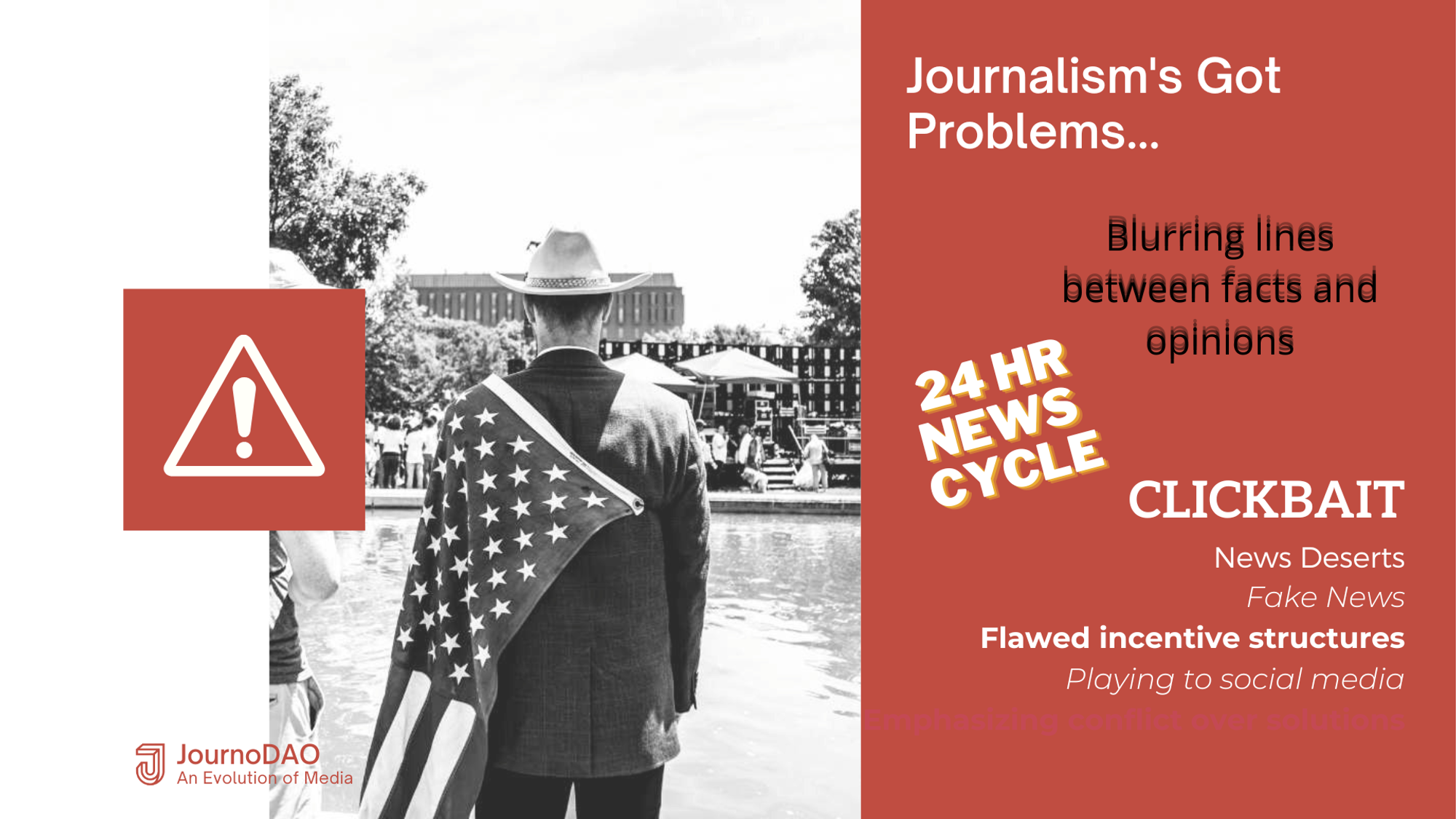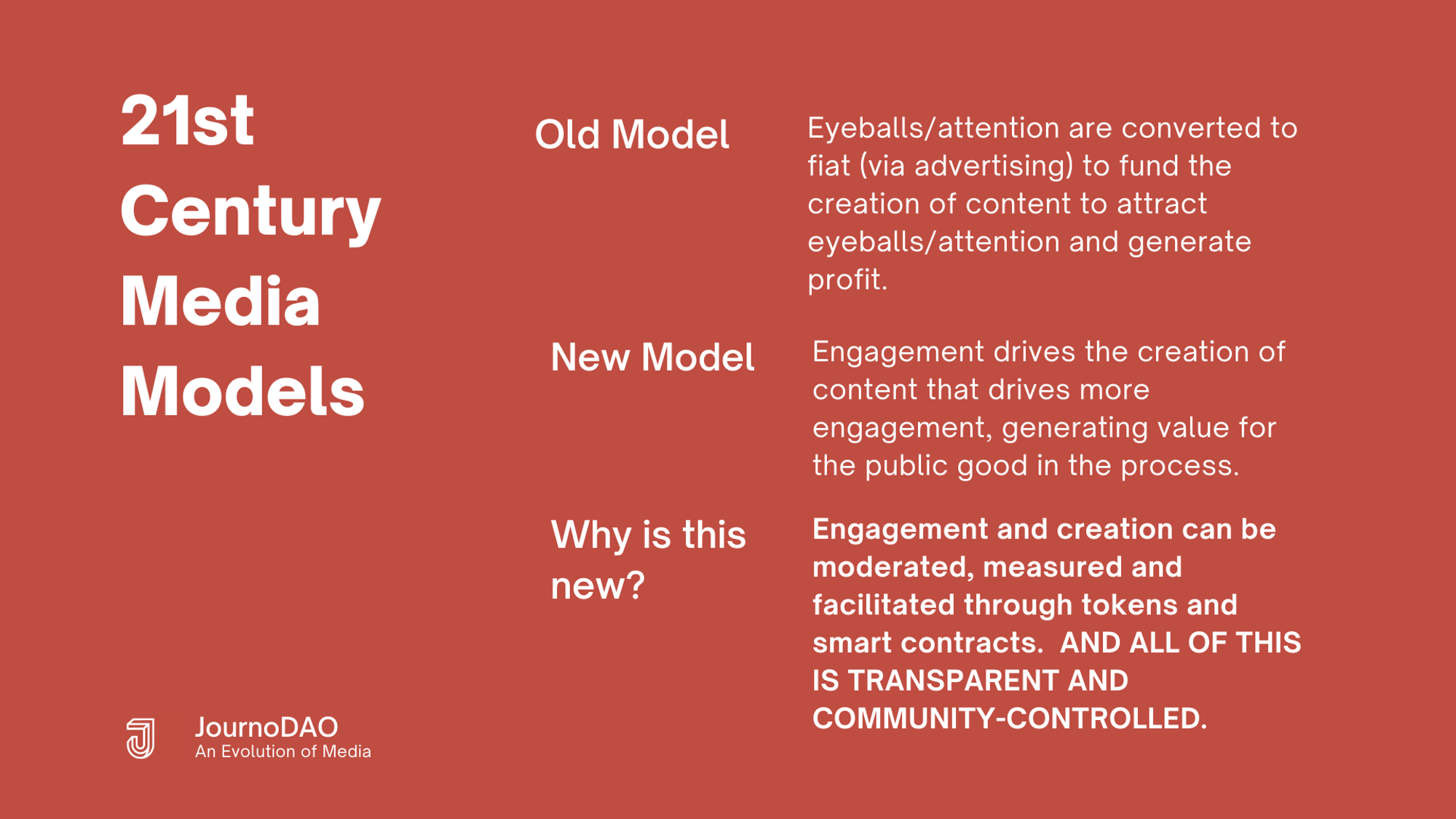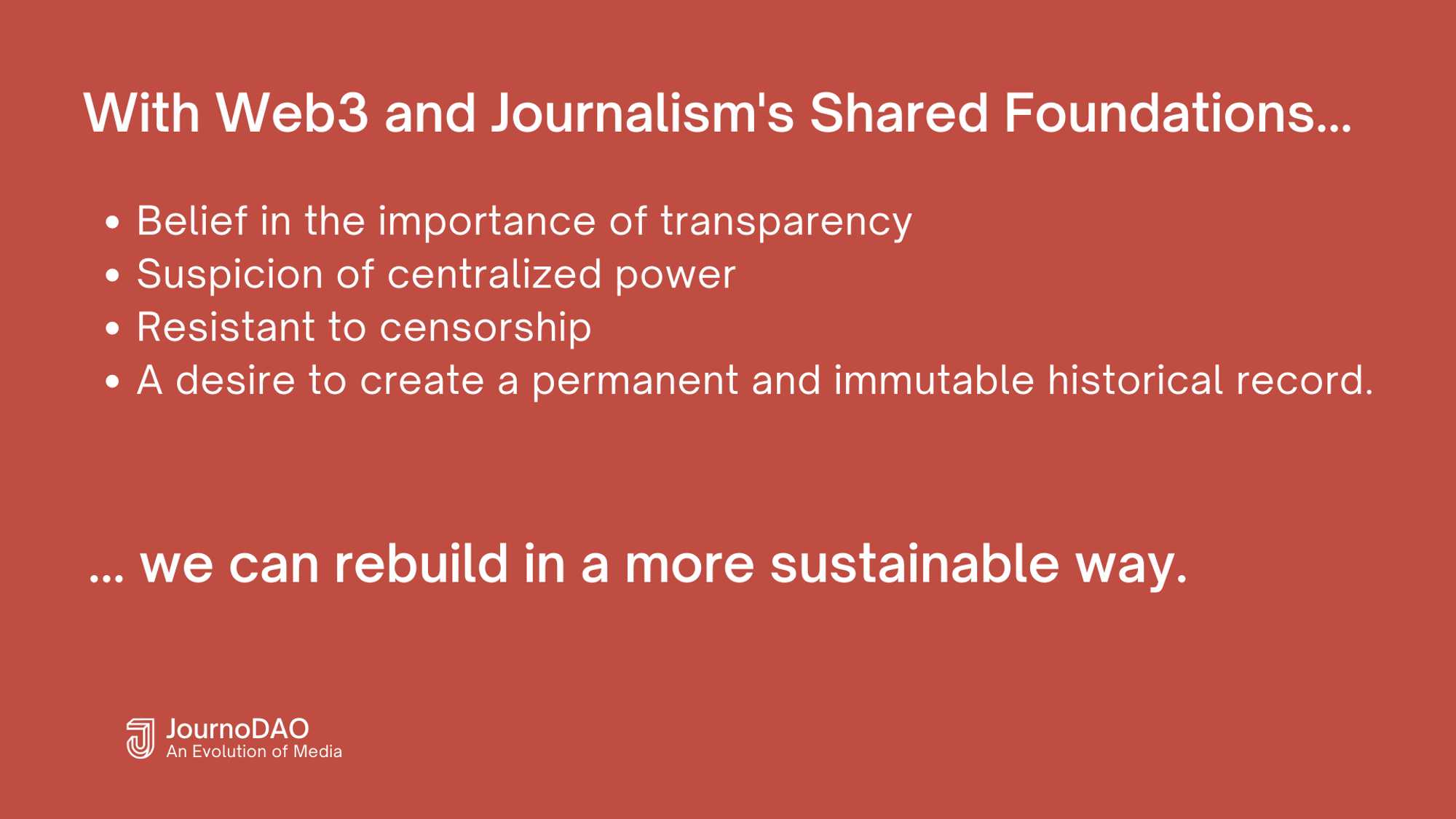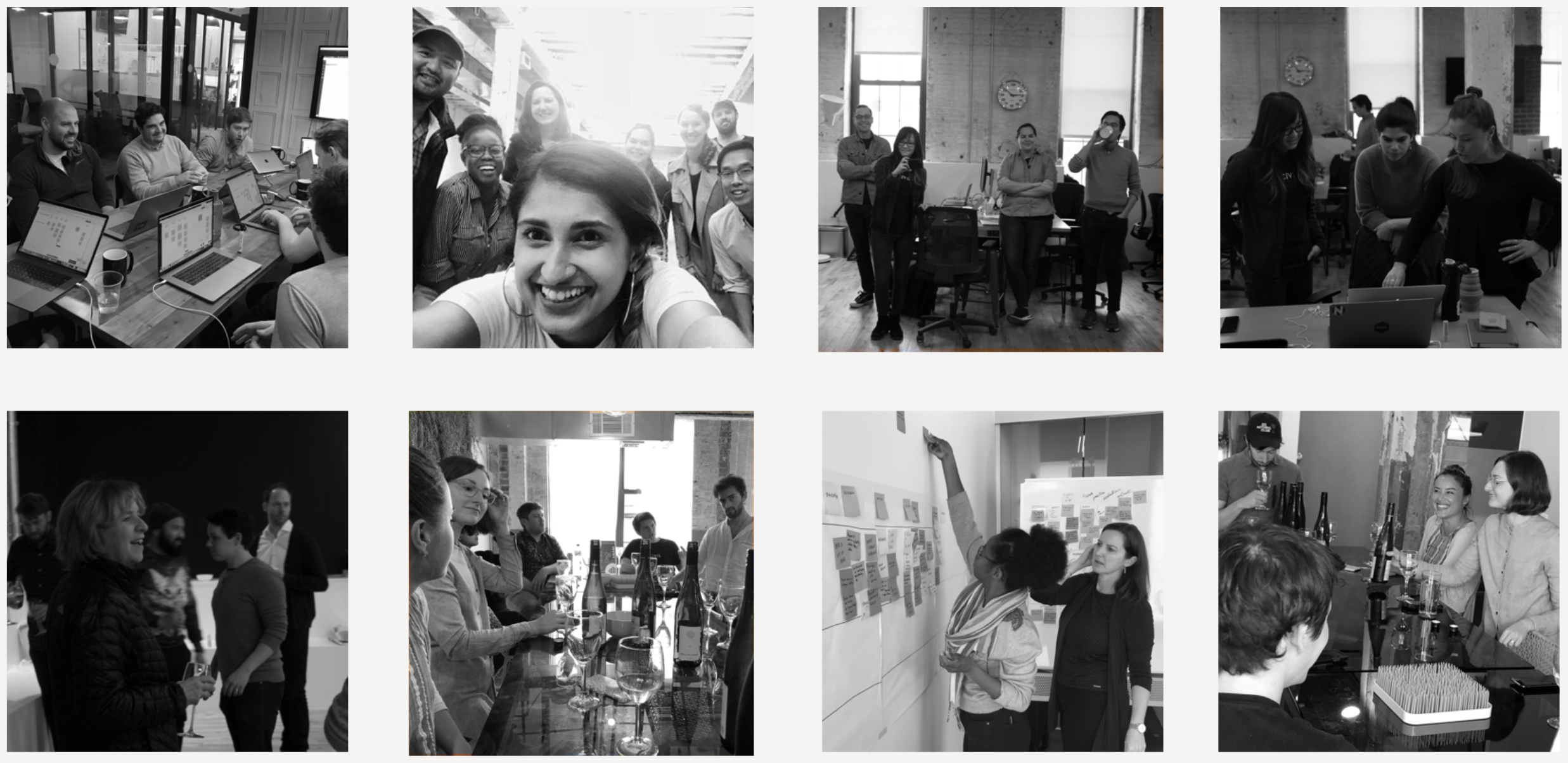
Broken News: Decentralizing Journalism To Restore Trust
 TL;DR - We’re developing techniques and tools to modernize the process of newsgathering and publishing through the principles of decentralization and the power of community. Our hope is to restore trust in journalism and revive reporting, especially at the local level where news deserts are causing democracy and civic life to dry up.
TL;DR - We’re developing techniques and tools to modernize the process of newsgathering and publishing through the principles of decentralization and the power of community. Our hope is to restore trust in journalism and revive reporting, especially at the local level where news deserts are causing democracy and civic life to dry up.
An Intro to the Problem: Trusted News Sources Are Going Extinct
It has to be one of the most common refrains in conversations with friends and family on newsy topics ranging from vaccines to vitamins to election results to artificial intelligence: “I just don’t know who (or what) to believe anymore.”
It’s not a new sentiment, but it suddenly seems to be ubiquitous. And with the dawning of a new era of Artificial Intelligence capable of mass producing content, it looks certain to get worse before it gets better.
I was hearing this long before our current era of Chat-GPT, fake news and polarized hot takes. I used to respond with what seemed like pretty wise words about getting news from a variety of trusted, reputable outlets. But this formula has started to fail at a startling rate in recent years and I’m much more likely to just commiserate with my fellow bewildered news consumers than offer advice these days.
And it’s not that I hang out with a rare crowd that bewilders easily.
A 2021 survey found upwards of 70 percent of Americans don’t trust the news media most of the time. Even more shocking, a Gallup poll earlier this year found more than half of survey respondents suspect news media of deliberately misleading their audience.
Interestingly, some of the same surveys show news consumers’ ire is directed primarily at the national and international news media. Readers, viewers and listeners tend to have more trust in their local news outlets, be it a newspaper, TV/Radio station, newsletter or neighborhood blogger.
Unfortunately, over the same time period trust in big name national and global outlets has cratered, thousands of local news outlets have shrunk, shuttered or completely disappeared.
This means basic reporting countless communities rely on to make decisions affecting their families, companies and schools simply isn’t getting done any more. As a result, civic life is drying up, it’s open season for corruption and we increasingly feel disconnected, alone and left to scream at hyper-polarized coverage on our televisions of national issues beyond our control.
Early marketplace sites like Craigslist and then Google and social media networks swallowed the advertising industry over the last two decades, collapsing the business model of smaller local news outlets. At the same time, the dominance of search and social has left just a handful of tech companies and their proprietary algorithms with an outsized influence on how the modern news cycle works. In a nutshell, these algorithms reward content that keeps people engaged and scrolling; a reliable way to do this is tapping into our more base tendencies like fear, rage and tribalism.

These incentives trickle down to numerous correspondents who confuse activism and partisanship for journalism, chase trends and clicks like any other influencers, and do so at the expense of less sexy but important stories, nuance, complexity and civic society as a whole.
And in the last year Large Language Model (LLM) AI systems have hit the scene and are already writing news. These content models are designed to create content that’s hard to discern from human-written text and they do a good job of it, but they currently can not be counted on to create accurate and factual content on their own. And yet they have been unleashed on the world and adopted faster than any other new tech in history.
This slow-motion mutation of the media is how we got to all of us feeling like we “just don’t know who to believe.”
Journalism is an institution meant to advocate for an audience that now suspects journalists of manipulating and misleading them. This is beyond a crisis, it is an utter catastrophe. It demands a complete overhaul of the practice of journalism down to its foundations.
Over the past 18 months, JournoDAO as a collective has been discussing what we and the broader Web3 ecosystem might do about this. Beyond countless threads in Discord, Telegram, Signal and elsewhere, we’ve held dozens of Zoom calls and traveled the world to speak with Web3 and media leaders about the problems and possible solutions.
Here’s a sampling of what we’ve come up with. We hope you’ll join us in building this vision.
-Eric Mack
Co-Founder, JournoDAO
(Part of the) Solution: Decentralization
Parts of the traditional newsgathering process are centralized around an editorial structure that helps ensure a certain amount of consistency, fact-checking and quality control under ideal circumstances. This workflow is arguably what defines journalism, setting it apart from lone voices simply passing on rumors, gossip or someone’s unfiltered agenda.
A command-and-control newsroom structure is also the legacy of cutthroat capitalist competition from an earlier era when many markets were still served by multiple news outlets. But today half the counties in the US and countless locales worldwide are served by either one or zero local newspapers. Over the years centralization led to consolidation, which led to abdication of many communities.
Citizen journalism has long been floated as a stopgap solution, but too many vital stories, issues and communities are still going uncovered. However, decentralized structures, values and tools combined with citizen journalism may be able to seed the fallow fields of our news deserts.
Consider the advantages:
- A decentralized approach to news is lightweight, efficient, cost-effective and compatible with the post-Covid world of remote collaboration.
- No more coastal or big city reporters “parachuting in” to cover major local stories; a decentralized network of contributors allows locals who know their communities best to tell their own stories.
- New business and incentive models can make sure the resources are available to cover communities adequately and individual contributors can have unprecedented control over their own compensation.
- Bringing more people closer to the process of news gathering will improve media literacy and begin to build back trust in journalism, as will decentralized databases that provide unprecedented new standards of transparency, accountability and censorship resistance to guard against fake news, deep fakes, AI-generated content and other new threats.
- Decentralized systems emphasize and encourage the building of strong communities, providing a 21st-century answer to the institution-sized hole the closure of many local newspapers left in cities and regions worldwide.

What does it look like?
JournoDAO is developing a decentralized protocol to take advantage of four key characteristics that are common to both distributed systems and the ethos of journalism — Immutability, transparency, censorship resistance and a healthy suspicion of centralized power (decentralization).
This protocol does not necessarily involve the creation of a brand new distributed network or “Layer 1” blockchain like Ethereum, or even an L2, L3, sidechain or parachain built on top of one (although it could). Instead we’re beginning with the development or integration of a stack of tools that emphasize these characteristics to create a modern way of reporting the news that’s more sustainable, credible and accessible. In particular, this decentralized reporting stack should be user-friendly enough for citizen journalists and tiny newsrooms to utilize it.
Our stack will consist of tools that provide web3-based solutions to modernize each layer of the news-reporting process, from the funding/capital layer, fact-checking, working with anonymous sources and other editorial processes to publishing, marketing and audience development.

When fully deployed and decentralized, we could envision newsrooms worldwide operating in a DAO-like structure, with each functioning as a node in a global network of journalism DAOs. The result could be a 21st century wire service consisting of numerous collaborating but autonomous outlets spanning a wide variety of geographic areas, topics, affinity groups, subcultures and other organizing principles we haven’t even thought of yet.
While our mission is to revitalize journalism and our first use case is to develop a decentralized reporting stack, we believe that this protocol could also find applications in just about any space where there is a need for information and data production, sharing, documentation and verification. Possible uses cases could include compliance, small governments, elections, deepfake / AI detection and project management.
Didn’t Someone Already Try This? (aka: Healthy Reasons For Skepticism)
If this sounds familiar, you’re not mistaken. A number of Ethereum OGs and some media veterans saw the same potential for blockchain to resuscitate journalism. They teamed up to launch Civil during the crazy ICO days of the last decade. In a nutshell, Civil set out to launch dozens of new newsrooms organized around an Ethereum-based token that would incentivize not only the news production process, but also reader engagement, fact-checking and more.

Civil.co
Over the past year we’ve spoken with a handful of people involved in Civil and other early blockchain startups with a media bent, like Po.et. Here’s the highlight from the lessons they shared and what we take away from the Civil experience:
- It was too early - The dawn of Civil was before NFTs became a mainstream acronym or the MetaMask mobile app launched. The roadmap required explaining lots of concepts that few people outside of software developers had any experience with, let alone fully understood. Half a decade later a number of artists have demonstrated non-financial use cases for tokens that will pave the way for journalism, too, to decentralize.
- The timing was all wrong - On top of being early in a broader sense, Civil was also late to the ICO craze. When it finally launched in late 2018, the token never sold well enough to adequately support the full vision.
- It was too centralized - The fact that a single lackluster token sale could ultimately tank the project was a sign that Civil shared more in common with a new media startup that happened to have a blockchain component than a truly decentralized protocol for news.
- It’s not fair to call Civil a failure - While the Web3 world may not think of it as a success, the truth is that Civil seeded some quite successful newsrooms that continue to operate today. The Colorado Sun, in particular, is a force for local news in a growing state. So much so, that the company that started when some former Denver Post journalists teamed up with Civil, not only survived the collapse of Civil, it has grown to the point that it recently purchased a chain of local newspapers in suburban Denver. Other surviving and thriving Civil newsrooms include Popula, Sludge and Block Club Chicago.
- Other doubts - It’s still early. Journalists don’t trust Web3. The UI/UX has a long way to go. All of these criticisms and many more are true, but we believe we’re further along now than when Civil launched. We’re advocating for taking a more open, experimental approach to see if we can continue to push things forward until the time is finally right.
What Sort of Reporting are We Talking About?
Our long-term vision is to build up decentralized networks for local and regional coverage, especially in current news deserts, but it will take some time to develop the tools and resources to get there.
Fortunately, we think we’ve got a few ideas for stories that lend themselves to being reported in a decentralized way, which we plan to launch as our initial crop of Decentralized Reporting Projects:
- Life in a world forever changed by Covid.
- Reducing and Adapting to a Changing Climate
- The Potential of Web3 and Policing Its Bad Actors
- Telling the story of Decentralized Reporting using decentralized approached (so meta)
How You Can Get Involved
At its heart, JournoDAO is a group of people who have continued to show up for over a year now to imagine a better future and dream up ways to build it together. We’re also part of a larger movement of like-minded folks: Impact DAOs, Regens, Solarpunks; we’re down for all the labels. Bottom line is we think decentralization is an imperative part of course correction for journalism, media, and society.
Even in today’s social media age, the news agendas and media narratives filtering down to our daily conversations still originate from a shockingly small group of gatekeepers and influencers who tend to share similar backgrounds, class status and networks.
This isn’t how modern storytelling and sense-making should work. The agendas and narratives that help us understand our world should bubble up from the streets, from the grassroots, from our communities.
In a decentralized approach, there is a potential role for everyone, regardless of your salary, follower count, highest degree attained or skillset. We all use stories to comprehend the universe and have our own stories to tell. That’s more than enough to be qualified to contribute. The challenge is in organizing those contributions on the never-ending journey of seeking truth and understanding better known as journalism.
So to start getting organized, we’ve identified a few initial ways that anyone who made it this far and is still interested can get involved:
- Join our community - Whether you just want to be part of the conversation, get involved with one of the pilot decentralized reporting projects above or you can help us test or develop a stack of tools for a modern, decentralized reporting process.
- Tell us about a beat, a story, a community or a news desert you know of that needs more attention or better news coverage.
- Join our directory of journalists and then collect your free, non-transferrable voting token to approve other applicants.
- Take our short survey
- Make a donation to journodao.eth
- Collect the Edition NFT of this post on Mirror
- Collect our Founders NFT - Support everything we do and be one of our forever besties and VIPs for everything we ever put out in the world.
You can also hit us up at feedback-at-journodao.xyz
We can rebuild this. We have the technology. We can make it better than it was.
Join us.
